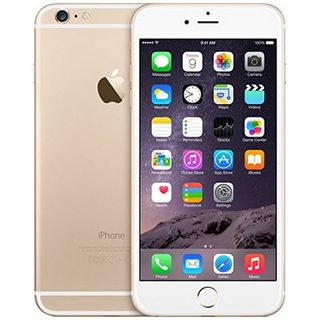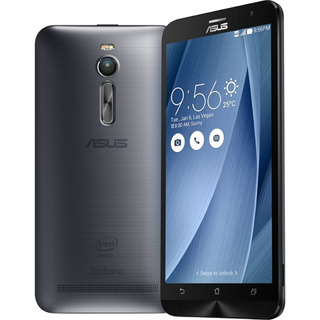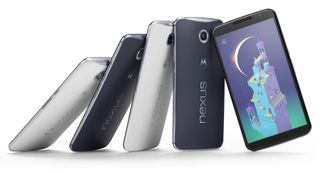LG G4 Review
The LG G4 retains a familiar look and still packs a removable battery and microSD slot, but it receives several internal upgrades, including a Snapdragon 808 SoC, an all-new camera, and a QHD IPS Quantum Display.
Why you can trust Tom's Hardware
CPU And System Performance
In this section, we evaluate system-level performance by running a series of synthetic and real-world workloads, along with some browser-based Web tests. There are several facets to overall device performance, including single- and multi-threaded CPU performance, memory and storage speed, and GPU rendering, all of which will be probed by our suite of benchmarks. If you're interested in learning more about how these benchmarks work, what versions we use, or our testing methodology, please read our article about how we test mobile device system performance.
| Products | CPU | GPU | RAM |
|---|---|---|---|
| Apple iPhone 6 Plus | Apple Cyclone+ (2x @ 1.4GHz) | PowerVR GX6450 | 1GB |
| Asus ZenFone 2 | Intel Atom Z3580 (4x @ 2.33GHz) | PowerVR G6430 @ 533MHz | 4GB |
| HTC One (M9) | Snapdragon 810ARM Cortex-A57 (4x @ 1.96GHz) + ARM Cortex-A53 (4x @ 1.55GHz) [big.LITTLE] | Adreno 430 @ 600MHz | 3GB |
| LG G4 | Snapdragon 808ARM Cortex-A57 (2x @ 1.82GHz) + ARM Cortex-A53 (4x @ 1.44GHz) | Adreno 418 @ 600MHz | 3GB |
| Nexus 6 | Snapdragon 805Qualcomm Krait 450 (4x @ 2.65GHz) | Adreno 420 @ 600MHz | 3GB |
| LG G3 | Snapdragon 801Qualcomm Krait 400 (4x @ 2.45GHz) | Adreno 330 @ 578MHz | 3GB |
| Samsung Galaxy S6 | Exynos 7420ARM Cortex-A57 (4x @ 2.1GHz) + ARM Cortex-A53 (4x @ 1.5GHz) | ARM Mali-T760MP8 @ 772MHz | 3GB |
On paper, Snapdragon 810’s two extra A57 cores and slightly faster A53 cores should give the HTC One M9 an advantage over the LG G4 in CPU performance; however, because of the 810’s serious overheating issue, HTC must be very conservative in how the higher performing A57 cores are used. Will chopping off two of the power-hungry A57 cores be enough to keep temperature under control and give the G4 an advantage? How much faster is the G4’s 808 compared to the older Snapdragon 801 and 805 phones?
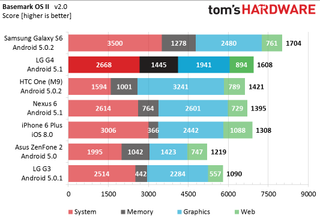
The LG G4 performs pretty well in Basemark OS II, coming in second to Samsung’s Galaxy S6 overall. Looking at the single- and multi-threaded CPU System test, we see the G4’s Snapdragon 808 easily outpace the M9’s Snapdragon 810 by 67%. During the test, the G4 keeps both A57 cores active and running between 1690MHz and its maximum 1824MHz clock speed. The M9, however, leaves at least two of its four A57 cores idling and limits the active cores to only 1248MHz to reduce heat buildup. Relying almost exclusively on the lower performing A53 cores, with their in-order pipelines, puts the M9 at a disadvantage relative to the out-of-order CPUs, relegating the M9 and the Snapdragon 810 to last place.
The 808’s initial victory over the 810 looks promising, but its performance relative to the other SoCs in the System test is less enticing. The G4 holds a negligible advantage over the Nexus 6 and G3 running the older Snapdragon SoCs, and it performs 24% slower than the Galaxy S6. It partially redeems itself in the CPU-centric Web test, coming in second behind the iPhone 6 Plus and performing 61% better than last year’s G3.
Qualcomm’s Adreno GPUs are still mysterious black boxes, with product numbering our only hint at relative performance. Using this crude indicator, the G4’s Adreno 418 GPU should be competitive with the Adreno 420 in the Nexus 6, especially considering they both have the same max frequency. However, in the Basemark OS II Graphics test, the Nexus 6 is 34% faster than the G4. Even the Adreno 330 GPU in the LG G3 is 18% faster, placing the newer G4 next to last in our test. This benchmark does render offscreen, so the G4’s higher screen resolution is not to blame. We’ll need to see the results from our other GPU tests before we can draw a conclusion.







Packing cutting-edge hardware, the Galaxy S6 leads the pack with the highest overall score. The G4 also scores well overall, although its inconsistent performance in the focused hardware tests hold it back, giving the G4 a slim 5% lead over the G3.
In CoreMark-HPC, we see the G4’s Snapdragon 808 outperform the M9’s Snapdragon 810 in CPU performance once again. The charts below compare the clock frequencies of the G4’s and M9’s A57 CPU cores during this test. During the brief single-core segment, the M9 keeps all four cores active but capped at 1536MHz compared to 1824MHz for the G4. Both devices leave the lower power A53 cores idle. When the multi-core segment begins, both devices run their four A53 cores at the max rated frequency, but differ in how they utilize their A57 cores. The Snapdragon 808 in the G4 keeps both A57 cores hovering around 1500MHz, but the M9 throttles back its A57 cores to essentially idle conditions. Due to thermal constraints, the 810 does not seem capable of using both the A53 and A57 clusters simultaneously. Instead, it tends to use one or the other, with a heavy preference for the A53 cluster.
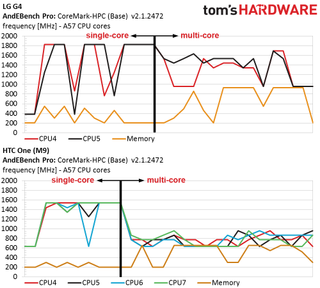
While the G4 tops the M9’s performance in CoreMark-HPC by 23%, it does not perform any better than the previous generation G3, which is a little disappointing. It also trails the older Nexus 6 and Asus’ significantly cheaper ZenFone 2. The Galaxy S6’s Exynos 7420 SoC uses a more efficient 14nm FinFET process, allowing it to run its four A57 cores at higher frequencies, giving it a 39% advantage over the G4.
Both the G4 and the M9 perform poorly in the memory latency test that measures the time to complete a series of random memory operations. Based on this, it appears that the memory controllers in both Snapdragon 808 and 810 are optimized for serial rather than random memory access, just like Apple’s A7 and A8 SoCs.
| AndEBench Pro Storage Test | |||||||||
|---|---|---|---|---|---|---|---|---|---|
| Row 0 - Cell 0 | 512B SW | 512B RW | 4KBSR | 4KBSW | 4KBRR | 4KBRW | 16KBRR | 256KB SR | 256KB RR |
| LG G4 | 404 | 991 | 23287 | 2742 | 23290 | 7640 | 63526 | 183804 | 184721 |
| Galaxy S6 | 537 | 1226 | 26882 | 3347 | 26634 | 9597 | 79176 | 213116 | 212411 |
| G4 % Diff | -25% | -19% | -13% | -18% | -13% | -20% | -20% | -14% | -13% |
| First letter: S=sequential, R=randomSecond letter: R=read, W=write | Values in KB/s - Higher is betterFile Size: 5, #Folders: 3, #Files/Folder: 1 |
The LG G4 does well in the storage performance test. Compared to the Galaxy S6, which uses newer UFS 2.0 based NAND and is the current leader in storage speed, the G4 is between 13% to 20% slower. In real-world testing, the S6 did open apps just a little faster than the G4, but with a difference of only one second or less, it’s safe to say that the G4’s storage performance is excellent.
The Platform test mimics a real-world workload by stressing CPU, memory, and storage performance. The memory access patterns appear to be mostly random, since the results in this test mirror those in the memory latency test. Therefore, it’s likely that the memory controller in the G4’s Snapdragon 808 SoC is the cause for its average performance with this workload.
It was strange to see the G4 come next to last in the Basemark OS II Graphics test, but it’s mystifying to see it finish first in the AndEBench 3D test. Hopefully, the results from our GPU and gaming tests in the next section can shed some light on what’s happening here.


Looking first at single-core performance, the G4 performs about the same as the M9. Its performance is also similar to the Nexus 6 and only about 20% better than the G3. Considering that the A57 CPU cores in the Snapdragon 808 SoC include additional SIMD cryptography instructions from the 64-bit AArch64 ISA, a feature that the older Krait-based Snapdragon 801 and 805 lack and that we’ve shown significantly boosts integer performance in Geekbench, the 808 in the G4 seems to be underperforming a bit here. The Galaxy S6, using the same CPU architecture, scores 43% higher than the G4 in the integer test and 28% higher in the floating-point test, even though it only has a 15% clock frequency advantage.
The G4 does better in the multi-core test, showing almost twice the integer performance and 38% better floating-point performance than the G3. The M9’s extra two A57 cores yield no tangible benefit, since it largely ignores the power-hungry A57s, allowing the G4 to equal its performance.


The synthetic benchmarks provide peak performance numbers, but to give us a better idea for how the LG G4 performs when doing things we normally do with smartphones, we turn to PCMark. Realistic workloads like these rarely run the CPUs at max frequency for very long and are a tradeoff between performance and battery life, with OEMs tuning the CPU governor to favor one or the other. Application code also stresses the hardware differently than carefully crafted synthetic code, which some devices handle better than others.
Overall, the G4 shows a modest 12% advantage over the Nexus 6 and M9, with a more noticeable improvement of 27% over the G3. The Galaxy S6’s impressive speed in the synthetic tests does not translate perfectly to the real world: It’s only 11% faster than the G4. The ZenFone 2 is the real surprise; Asus’ mid-range model trumps the flagships in practical performance, scoring 21% higher than the G4 overall.
Continuing our comparison of the Snapdragon 808 and 810 shows that even in these less demanding tasks, the 810 in the M9 struggles to keep its cool. The 808 in the G4 leads the faster-on-paper M9 in every scenario. In the critical Web Browsing test, the G4 is only 5% faster than the M9. The G4 puts its A57 cores to good use in the Writing test, giving it a 52% advantage over the M9, which basically ignores its A57 cores.



The G4 performs well in our browser-based tests, leading all non-Apple phones in JSBench and Google Octane. Browsermark shows the current generation flagship phones clumped together at the top of the chart, with the G4 performing 39% better than the G3.
Based on our analysis, it looks like LG made the right call passing on the Snapdragon 810 and using the 808 in the G4. The 808 is as fast or faster than the 810 in nearly every system test, and it largely avoids the 810’s thermal issues, allowing it to use its two A57 cores more often and at higher clock speeds.
While the G4 performs better than HTC’s One M9 and provides a modest 30%-40% improvement over last year’s G3, it cannot keep pace with the UFS 2.0 NAND, LPDDR4 RAM, and 14nm FinFET SoC packed into Samsung’s Galaxy S6. It even gets humbled by the lower priced ZenFone 2 when running real-world workloads.
The LG G4 is not the fastest phone available, but it’s still fast enough. The UI is generally responsive, Web pages scroll pretty smoothly, and apps launch quickly thanks to the G4’s speedy internal storage. Switching between portrait and landscape views seemed a bit slower than on the S6 and exiting LG’s Smart Bulletin screen caused a very brief pause while redrawing the wallpaper. However, the G4 handles multitasking better than the S6, with far fewer app reloads, and there was no noticeable slowdown when using two apps in Dual window mode. Overall, the G4’s system performance will not earn you any bragging rights, but it will leave a smile on your face.
Stay on the Cutting Edge
Join the experts who read Tom's Hardware for the inside track on enthusiast PC tech news — and have for over 25 years. We'll send breaking news and in-depth reviews of CPUs, GPUs, AI, maker hardware and more straight to your inbox.

2D transistors can mimic a locust's brain to avoid collision— super-efficient tech could lower the energy costs of tomorrow's AI

No storage is safe from price hikes -- Seagate raises hard drive prices, blaming inflation and market forces

DeepCool latest Mini-ITX case sports a carrying handle and lots of mesh
-
cknobman Wife absolutely loves this phone and glad she picked this over the Samsung S6.Reply
While it does not have quite the specs the Galaxy S6 does the microSD slot and the removable battery make it the easy choice.
LG gave her a free premium leather cover and a extra battery with charging cradle.
Sealed batteries are terrible because when they go bad you either ditch the phone or pay big money to have it replaced.
I learned the hard way with my last phone that had a sealed battery, it will never happen again. -
geosol62 DONT YOU THINK THIS REVIEW IS A DAY LATE???? WTF!!!Reply
GET WITH THE Z170 ROUND UP ALREADY! -
jimmysmitty Reply16981641 said:Wife absolutely loves this phone and glad she picked this over the Samsung S6.
While it does not have quite the specs the Galaxy S6 does the microSD slot and the removable battery make it the easy choice.
LG gave her a free premium leather cover and a extra battery with charging cradle.
Sealed batteries are terrible because when they go bad you either ditch the phone or pay big money to have it replaced.
I learned the hard way with my last phone that had a sealed battery, it will never happen again.
I agree that a SD card slot would be nice but the battery is something I am not as convinced because most people move on from a smart phone in two years (now sooner with the new way they do their plans) and I have had a lot of phones and never had a battery die in that two year period. Only one of them started having issues with longevity of use and that was the Droid Bionic I had that was known for having horrible battery life.
The microSD is very nice though for music and pictures, especially if you use FLAC quality audio or take a ton of pictures.
I hops Samsung at least puts that back into the S7 but then again the Lumia 950XL looks very tempting especially with the USB Type-C and docking station. -
Rob_9_ The G5 could well be launched in 7-8 weeks. Tom must've been writing this this review for a good while ;-) I have a G4 - it's fast, reliable, skinny, has a beautiful display and you can swap the battery out when it gets low.Reply
LG work closely with Google and Quallcomm to get fast(ish) updates and searing performance.
The headphone jack is on the bottom so it doesn't dangle weirdly and obtrusively from the top of your device like most other handsets. Plus, you can edit the nav keys any way you want which is a welcome relief from the awkward placement of the stock buttons.
I've owned loads of phones. Ignore these benchmark and gamut 'ratings'. This phone really is awesome. And it's now very cheap. -
cknobman ReplyI hops Samsung at least puts that back into the S7 but then again the Lumia 950XL looks very tempting especially with the USB Type-C and docking station.
I have a Lumia 950xl on pre-order, ships Nov 25th.
Looking forward to it. -
SamSerious Apart from this review being more than late, i stopped reading after the first ten sentences. It is nonsense that early LG phones lacked quality and were copies of what Samsung offered at the same time. The firmware often spoiled the otherwise good phone, ok, but e.g. the build quality was always very high, these things were built like bricks. Even my Optimus P880 ist way more solid than any Samsung Andorid phone i know.Reply -
innocent bystander Got a G3 and nothing I see here makes me want to upgrade.Reply
Then again, I'm the type of smartphone user for whom a full charge will last 3 days... -
ptrick2000 It was impossible for me to delve into the review itself after reading the first paragraph. The Monkees later output produced generally great records? This analogy is an insult to LG.Reply -
SirGCal The V10 is out for everyone accept Sprint and the G4 Pro (GIMME GIMME GIMME) is rumored to be right around the corner. So this does seem a bit late.Reply
